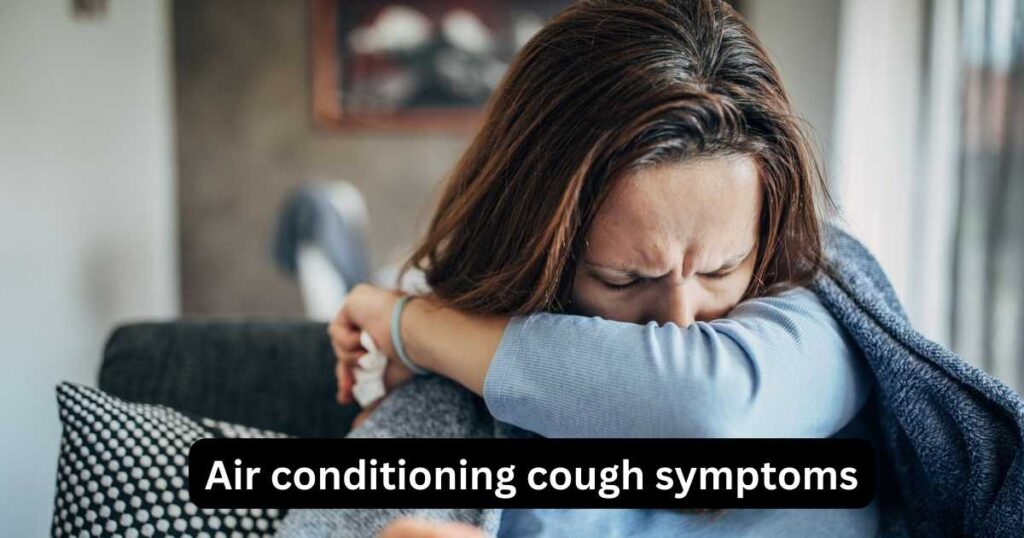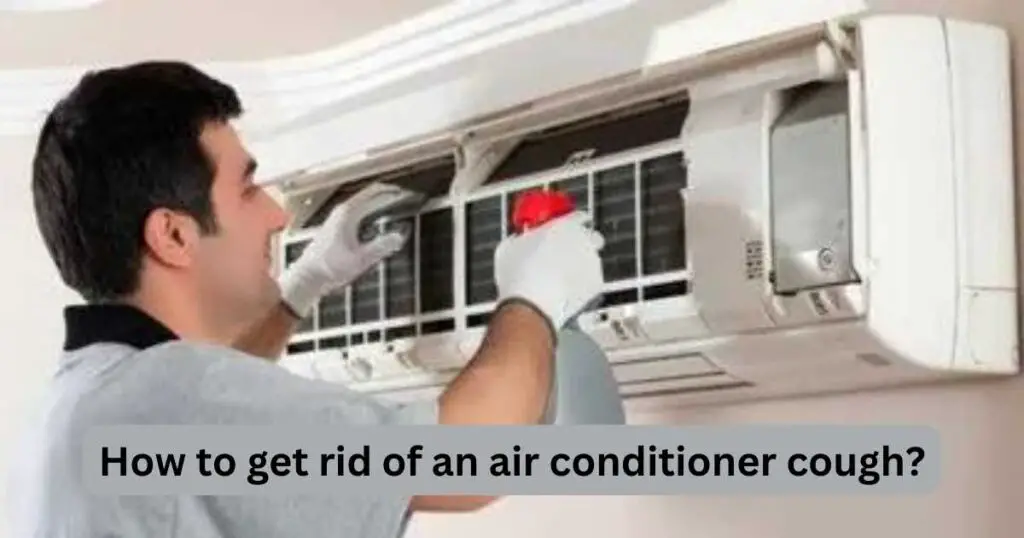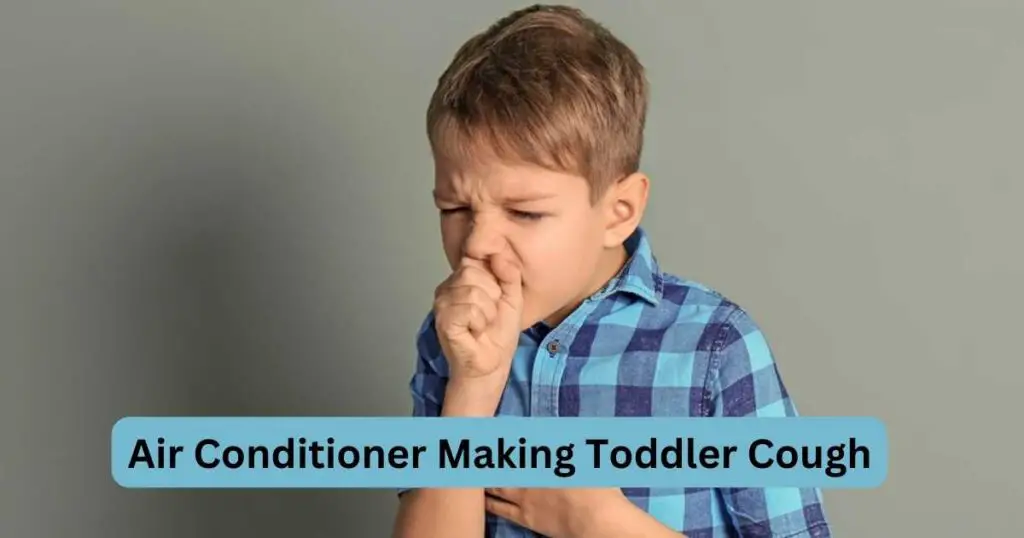If you suffer from allergies or asthma, you may be wondering can air conditioner cause coughing. The short answer is yes – air conditioners can indeed cause coughing in some people. However, it’s important to note that not everyone is affected in the same way.
Some people may only experience a cough when they first turn on their air conditioner for the season, while others may find that their cough persists as long as the unit is running. There are a few different reasons why air conditioners can cause coughing in some people. One possibility is that the unit is simply blowing dust and other allergens around, which can trigger an allergic reaction or Asthma attack.
Another possibility is that the cool, dry air produced by an air conditioner can irritate your throat and lungs, leading to a cough. If you have either of these conditions, it’s important to talk to your doctor about ways to minimize your symptoms. In some cases, using a humidifier in conjunction with your air conditioner can help offset the drying effects of the cool air.
In this blog post, we will try to find the answer to can air conditioner cause coughing or not, discuss the possible reasons, and how to overcome those. So, let’s read this post to learn how to stay cool and safe on a hot summer day.

Can Air Conditioner Cause Coughing? The Truth!
It is possible for an air conditioner to cause coughing, as it can potentially circulate allergens, pollutants, or even mold throughout a space. This can irritate the respiratory system and lead to coughing, especially for individuals with pre-existing respiratory conditions.
However, proper maintenance and regular cleaning of air filters can help prevent these issues and promote healthy air quality. It is important to consult with a professional if coughing persists or worsens after prolonged exposure to an air conditioner.
Why Does Air Conditioning Make Me Cough – Discover the Causes
Air conditioning can sometimes cause coughing in individuals, and there can be several potential causes for this discomfort. Here are some common reasons why air conditioning may lead to coughing:
Dry Air:
Air conditioning systems often remove moisture from the air, resulting in low humidity levels in the environment. Dry air can irritate the respiratory tract and cause coughing, especially for individuals with sensitive airways or pre-existing respiratory conditions.
Allergens and Indoor Air Quality:
Air conditioning units can circulate allergens such as dust, pollen, pet dander, and mold spores. These allergens can trigger coughing and other respiratory symptoms, particularly for individuals who are allergic or sensitive to them. Poor indoor air quality can also contribute to coughing.
Cold Air:
Sudden exposure to cold air from an air conditioning system, particularly if it is blowing directly on a person’s face or body, can cause the airways to constrict. This constriction can lead to coughing, particularly in individuals with asthma or other respiratory conditions.
Contaminated Air Filters:
If the air filters in the air conditioning system are dirty or contaminated, they can release particles and pollutants into the air. Breathing in these pollutants can irritate the airways and trigger coughing.
Chemical Irritants:
Air conditioning systems sometimes release chemical irritants, such as cleaning agents or volatile organic compounds (VOCs), into the air. These chemicals can cause respiratory irritation and coughing in some individuals.
Inadequate Ventilation:
Improperly maintained or poorly designed air conditioning systems may not provide adequate ventilation, leading to a buildup of indoor air pollutants. Breathing in these pollutants can irritate the respiratory system and result in coughing.
Air conditioning cough symptoms
Air conditioning cough, also known as air conditioning sickness, is a condition caused by exposure to air conditioning systems. Symptoms of this condition may vary from person to person, but some common symptoms include:
- Dry throat
- Persistent Coughing
- Runny or stuffy nose
- Sore throat
- Itchy or Watery eyes
- Headache
- Fatigue
- Dizziness
These symptoms are caused by the cold and dry air that air conditioning systems produce, which can irritate the respiratory system and cause inflammation. Those who are most susceptible to air conditioning cough are young children, the elderly, and those with pre-existing respiratory conditions such as asthma.
If you experience any of these symptoms, it is important to seek medical attention to determine the cause and receive appropriate treatment.

How to get rid of an air conditioner cough?
If air conditioning is causing you to cough, you can try the following measures to alleviate the symptoms:
Use a humidifier: Adding moisture to the air can help combat dryness and reduce irritation in the respiratory system.
Keep the air filters clean: Regularly clean or replace the air filters in your air conditioning system to prevent the circulation of allergens and pollutants.
Maintain good indoor air quality: Keep your indoor environment clean and well-ventilated. Vacuum regularly, minimize dust, and control humidity levels.
Adjust the temperature and airflow: Avoid direct exposure to cold air from the air conditioning unit. Adjust the temperature settings and direct the airflow away from your face.
Seek medical advice: If your coughing persists or worsens, it is advisable to consult a healthcare professional for a proper evaluation and personalized advice.
Remember, these suggestions are general in nature, and individual sensitivities and health conditions may vary. Consulting with a healthcare professional or an HVAC specialist can provide tailored recommendations based on your specific situation.

How Do You Get Rid of an Air Conditioner Cough?
If you’re noticing a cough developing after turning on your air conditioner, there are a few possible causes and solutions. Many people experience what’s known as an “air conditioner cough” when they first start using their AC for the season. This is usually caused by dust and pollen that has accumulated on the unit over the winter months being circulated through your home.
To get rid of an air conditioner cough, start by cleaning or changing your air filter. You may also need to clean the coils on your unit if they are dirty. If you have severe allergies, you may want to consider using an air purifier in conjunction with your AC to help keep the air quality in your home at a safe level.
How Long Does Air Conditioning Cough Last?
Assuming you are referring to a common cold, the answer is typically around two weeks. However, air conditioning can also aggravate other conditions, such as allergies or asthma. In these cases, the effects of air conditioning may last much longer.
Why Does Air Make Me Cough?
When you take a breath, air moves through your mouth and nose and down into your lungs. As the air passes over the moist lining of your respiratory tract, it picks up dust, pollen, and other particles. These particles can irritate the lining of your respiratory tract and cause you to cough.
Coughing is one way your body protects itself from these irritants. When you cough, the muscles in your chest and abdomen contract. This forces a burst of air out of your lungs that can remove the irritants from your respiratory tract.
In most cases, coughing is a normal and healthy response to irritants in the air. However, some people cough more often than others, and for some people, coughing can be a sign of an underlying medical condition. If you’re concerned about your coughing, or it’s interfering with your daily activities, talk to your doctor.
Air Conditioning Causing Dry Cough
If you’re someone who suffers from a dry cough, you may be wondering if your air conditioning could be to blame. After all, dry coughs can be caused by a variety of things, including allergies, colds, and even acid reflux. So it’s possible that your AC is exacerbating your condition.
There are a few ways to tell if your air conditioning is causing your dry cough.
First, pay attention to when your cough occurs. If you find that it’s worse at night or first thing in the morning when you’re spending more time in a cooled room, that’s a clue that the AC could be involved.
Another way to tell is by looking at your mucus. If it’s particularly dry and thin, that can be another sign that the air conditioning is drying out your respiratory system and making your cough worse. Of course, it’s always best to see a doctor if you’re concerned about your health.
But if you think your AC might be contributing to your dry cough, there are a few things you can do to help ease the symptoms. First, try using a humidifier in your bedroom at night to add some moisture back into the air. You can also try adjusting the temperature on your AC unit so that it’s not quite so cool.
And lastly, make sure to stay hydrated by drinking plenty of fluids throughout the day.
Air Conditioner Making Toddler Cough
If your air conditioner is making your toddler cough, it’s likely because the unit is not properly maintained. A poorly maintained air conditioner can cause a number of health problems for young children, including respiratory infections and asthma. To keep your toddler safe and healthy, make sure to have your air conditioner serviced regularly.
This will ensure that the unit is clean and free of any harmful bacteria or mold. Additionally, be sure to keep the filter clean and replace it every few months. By taking these simple steps, you can help to prevent your child from getting sick.

Tickle in Throat from Air Conditioning
If you have ever woken up with a tickle in your throat that just won’t go away, it’s possible that the culprit is your air conditioner. While it may seem counterintuitive, dry air from your AC unit can actually cause irritation in your throat and nasal passages, leading to that pesky tickle. There are a few things you can do to help prevent this problem.
First, make sure that you are using a humidifier in your home to add some moisture back into the air. This will help keep your throat from drying out. You can also try using a HEPA filter in your AC unit, which will trap more allergens and irritants from circulating through your home.
Finally, be sure to drink plenty of fluids throughout the day to keep yourself hydrated. If you are already dealing with a tickle in your throat, there are a few ways to get relief. Gargling with warm salt water can help soothe the irritation and break down any mucus that may be causing the problem.
Drinking lots of fluids will also help thin out any mucus and keep your throat moistened. And if all else fails, over-the-counter medicines like cough drops or lozenges can provide temporary relief until the problem goes away on its own.
VERIFY: Do air-conditioners cause sinus congestion?
Conclusion
If you find yourself coughing more when you’re around your air conditioner, it could be because of dust, mold, or other pollutants in the air. These particles can irritate your throat and lungs, causing you to cough. If you have allergies or asthma, you may be more sensitive to these irritants and may need to take steps to avoid them.